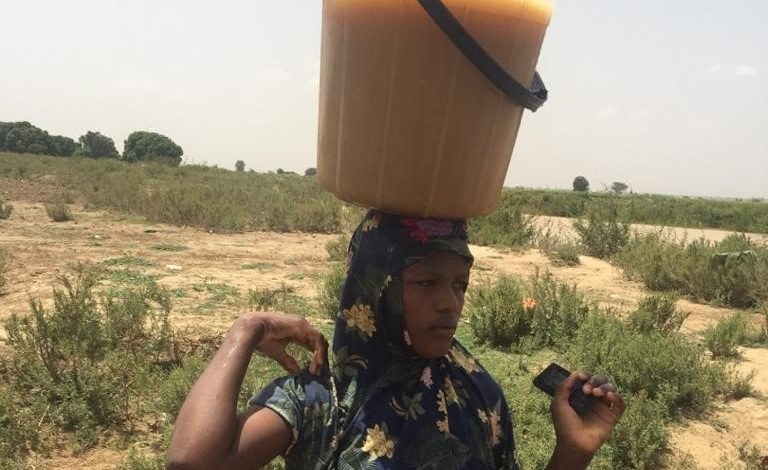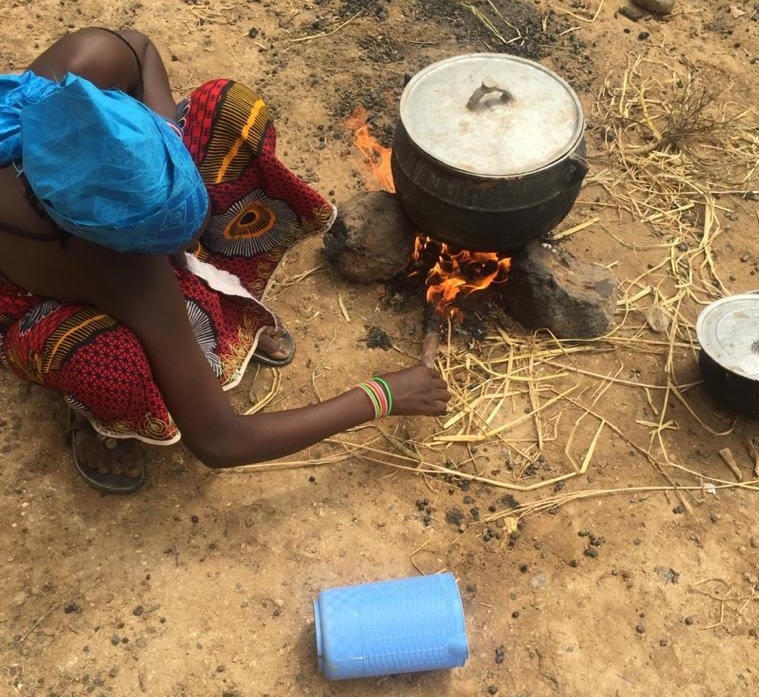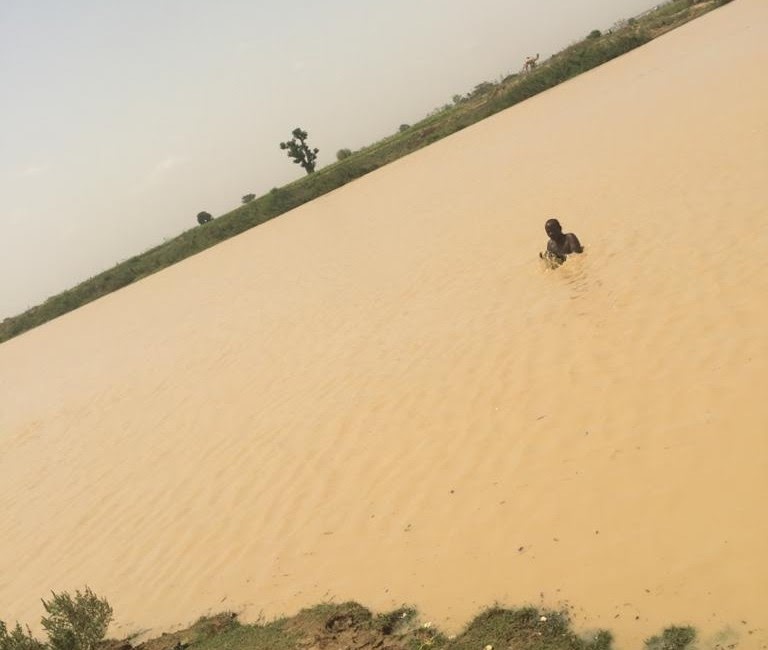Sokoto Communities Face Recurring Diseases Over Poor Water Sources
Communities in Sokoto state, Northwest Nigeria, are facing various diseases due to poor water available to residents in those communities.

Aminu Aishatu, mother of three, like many other villagers at Dundaye in Sokoto State, Northwest Nigeria has for over 10 years been drawing water from a river for drinking purposes and other domestic use.
Daily, Aishatu sends her daughters to the river that flows through Dundaye village to draw water for their daily use. The water from the river is not clean but villagers have resigned to fate as there are no alternatives.
Although her three children grew up drinking from the same water, she told HumAngle she had a hunch the frequent sickness by one of them could be as a result of the unclean nature of the water.
“I have been living here for over a decade, drinking and cooking with stream water because there are no other means,” she says. “One of my children has been sick and I was told it is typhoid.’’
“In this neighborhood, we don’t have any clean and safe water, the only means for us is to drink from this stream water. This stream as you can see runs to like nine communities and they also drink from it as well.”

In a report in March 2018, United Nations Children’s Fund (UNICEF) said access to safe drinking water remains a challenge to the majority of Nigerians, especially those living in the rural areas.
“The recent Multiple Indicator Cluster Survey (MICS), conducted by the Government of Nigeria in 2016/17, indicates that about 40 per cent of households and about 69 million people, do not have access to clean water sources. In the rural areas, 19 million people walk long distances to collect unsafe water from lakes, streams and rivers,” the UN agency said.
Waterborne diseases are common in rural communities where residents rely on unsafe water for drinking and domestic chores. UNICEF further stated that children without access to safe water are more likely to die in infancy and throughout childhood from waterborne diseases. “Diarrhea remains the leading cause of death among children under five years of age in Nigeria,” it added.
Livestock drink from the same water with humans

As Aishatu pointed to the flowing river, Muhammadu Yakubu, 35, herded his cows towards the river bank for them to drink. While his cows were quenching their thirst, he took an empty bottle from his bag and filled it with the same water. He had some sips before putting the lid on the bottle.
“I don’t think the water is harmful since we have no alternative. Thus, the community has started reaching out to the government but nothing is done about it,” Yakubu said.
At Kwakwalawa village, residents depend largely on water from open source, the Kwakwalawa river. Adamu Balikisu, also a mother of three, fetches water from the river. But unlike Aishatu, Balikisu says she often purifies the water with alum before using it, a process that does not guarantee potability of the water.
“I add alum to the water before my family and I drink it. The particles will then go down and the clean water will be up,’’ the 25-year-old woman said.
More children admitted for typhoid
Tahiru Salisu, a resident of the Dundaye community, laid on a wooden-bench in front of the community’s health care facility, lamenting bitterly about the health condition of his daughter.
Like other children in the community, Salisu’s daughter was diagnosed with typhoid, a water-borne disease.
“I have been here for two weeks, taking care of her with our community nurse,” Salisu said. “She just woke up in the middle of the night and started complaining of headaches. We immediately rushed her here while her condition became critical. And if you check around this community, you can’t find any borehole except well water. Some people don’t fetch water from it because it’s still similar to the stream,’’ the 33-year-old-man added.
Abdullahi Meimunatu, a mother of two in the Dundaye community, told HumAngle her family members often suffer from recurring typhoid fever. She didn’t know the cause until she was recently informed at the community’s health centre it was from the stream water they were consuming.
While her children were lucky to have escaped death as a result of the water borne disease, some others in her neighbourhood were not.
“Some of our neighbors who used to complain of the same symptoms died of it. We were ignorant that the water we drank had caused a lot of health implications to our bodies. We have strived to stop drinking it but we don’t have any other means.’’
Adamu Hannatu, a widow and mother of five in the Kolkolawa community, almost lost her first son to typhoid. While her child was sick, Hannatu said she used water from the same stream to treat him. But the villagers have no alternative water source.
“I used the same stream water to feed him local self-medications. Yet, despite all my efforts, his state of health became worse.”
Mudammadu Mah’amudu, the chief of the community, said the dirty water runs through the entire Sokoto town. He also stated that a lot of people lost their lives due to the diseases they contracted through this water.
“’We have written several letters to the government, clamoring for potable water, even the youths did the same thing but nothing was done,” Mah’amudu said.
“This stream water is causing a lot of damage to our health in this community and Sokoto entirely. This stream water joins many communities in the state and they are drinking it there as well.”
According to him, the community recorded a high death rate through many water-infected diseases, not only typhoid.
“Between 1996 and 1997, people contracted diarrhea due to the dirty stream water they consumed in this community. Some people lost their lives because of its aftermath. We’ve experienced a high number of deaths between June-July this year again.’’
Remote communities not reached by water interventions
Despite various interventions from donor agencies and the Nigerian government to tackle water scarcity in the state, rural communities do not have access to safe water.
In June, the United States Agency for International Development (USAID) announced that it has awarded $10 million (N4.1 billion) over three years to UNICEF to support the Nigerian government’s initiative to improve water, sanitation and hygiene (WASH) services in Kebbi, Sokoto and Zamfara States in the Northwest.
“USAID is committed to ensuring that more Nigerians have access to clean water,” Mission Director, Dr Anne Patterson, said in a statement . “This new partnership with UNICEF will aid in the reduction of waterborne infections, allowing more people, particularly children, to stay healthy.”
According to WaterAid Nigeria, an NGO focused on WASH, one out of every three people, or 59 million people in Nigeria, lacks access to safe drinking water. The organisation said poor water and sanitation kill 59,500 children under the age of five every year in the country.
Ajibola Fausat, a medical practitioner, expressed worries over the safety of the water people consume. According to her, “when a water source gets contaminated as a result of pollution, it can cause human health problems such as cancer, cardiovascular disease, and cholera.”
“It is vital to understand that the health consequences people have, may or may not show up right away,” Fausat told HumAngle in an interview.
“The intensity of the actual impacts observed is determined by characteristics such as the person’s overall health, age, and physical condition. As we all know, water is a necessity for every life on the planet.”
Governor furious over water scarcity in the city but quiet on those in rural areas
Despite rural communities not having access to clean and safe water, Aminu Tambuwal, Governor of the state on April 16, read a riot act to the management of the state water board for the acute water scarcity faced by residents of the state.
He threatened to suspend the management staff of the board if water supply was not restored in some parts of the state.
“Many families could not afford domestic water expenses, including myself. I had to buy pure water for my wife to cook our breakfast,” the governor had said.
“In fact, I give the officials of the state water board up to Friday to restore water supply to the affected communities or be sanctioned because I don’t see any reason why our people should continue to suffer.”
Umar Bature, the state’s Commissioner for Water Resources attributed the problem to the ongoing road and waterways construction which damaged many pipelines.
“But our men are working round the clock to repair them and restore the supply,” he said.
Support Our Journalism
There are millions of ordinary people affected by conflict in Africa whose stories are missing in the mainstream media. HumAngle is determined to tell those challenging and under-reported stories, hoping that the people impacted by these conflicts will find the safety and security they deserve.
To ensure that we continue to provide public service coverage, we have a small favour to ask you. We want you to be part of our journalistic endeavour by contributing a token to us.
Your donation will further promote a robust, free, and independent media.
Donate HereStay Closer To The Stories That Matter





A job well–done from the journalist. In all honesty, the rural dwellers need more attention and support, not only from the government, but also NGOs with which there aims and objectives is ensuring good well–being for all, at all age (SDG 3).
It is sadden that some universities in the north are also victims. Their students are victims of water borne diseases.
Hopefully, the effort of a journalist like this, like many others, should continue to expose the state and condition of a situation like this, in order to have an healthy environment. And this is also a responsible of all us. Working together for social impact in our society should be our priority. We owe it all.
Once again, well–done to this journalist.